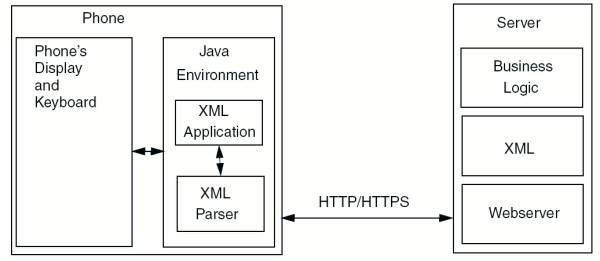Difference between revisions of "XML Applications"
The Wiki of Unify contains information on clients and devices, communications systems and unified communications. - Unify GmbH & Co. KG is a Trademark Licensee of Siemens AG.
| Line 1: | Line 1: | ||
== Overview == | == Overview == | ||
The graphical user interface provided with OpenStage 60/80 phones can be used to develop own applications for special purposes. XML applications enable the phone to act as a front-end to a server-side program. Moreover, XML applications have the capability of controlling calls. | The graphical user interface provided with OpenStage 60/80 phones can be used to develop own applications for special purposes. XML applications enable the phone to act as a front-end to a server-side program. Moreover, XML applications have the capability of controlling calls. | ||
| + | |||
| + | The '''Push''' feature allows the server-side program to send information in an unsollicited manner | ||
Possible uses are, for instance: Integration with groupware (e.g. Microsoft Exchange Server) or Unified Messaging systems (e.g. Siemens OpenScape); gathering information provided by web services (e.g. weather, traffic, stocks); dialing aids with access to address databases. | Possible uses are, for instance: Integration with groupware (e.g. Microsoft Exchange Server) or Unified Messaging systems (e.g. Siemens OpenScape); gathering information provided by web services (e.g. weather, traffic, stocks); dialing aids with access to address databases. | ||
| − | |||
== Availability == | == Availability == | ||
| Line 14: | Line 15: | ||
<pre>137.223.238.174/serverProgram&phonenumber=4711</pre> | <pre>137.223.238.174/serverProgram&phonenumber=4711</pre> | ||
| − | The server-side program then generates an XML document, which is delivered to the phone over HTTP/HTTPS. | + | The server-side program then generates an XML document, which is delivered to the phone over HTTP/HTTPS. In the phone, the XML document is parsed and displayed on the graphic display. The user enters commands and data using the [[TouchGuide]]<sup>TM</sup> and the keypad. The phone transmits the user entries to the server-side program in the form of key/value pairs. |
| − | |||
| − | In the phone, the XML document is parsed and displayed on the graphic display. | ||
| − | |||
| − | The user enters commands and data using the TouchGuide and the keypad. | ||
| − | + | For details about the components involved in the operation of an XML application, see the following diagram: | |
| − | + | [[Image:xml applications components.gif]] | |
Revision as of 15:01, 24 September 2007
Overview
The graphical user interface provided with OpenStage 60/80 phones can be used to develop own applications for special purposes. XML applications enable the phone to act as a front-end to a server-side program. Moreover, XML applications have the capability of controlling calls.
The Push feature allows the server-side program to send information in an unsollicited manner
Possible uses are, for instance: Integration with groupware (e.g. Microsoft Exchange Server) or Unified Messaging systems (e.g. Siemens OpenScape); gathering information provided by web services (e.g. weather, traffic, stocks); dialing aids with access to address databases.
Availability
XML applications are available in OpenStage 60/80 phones with SIP firmware version V1R3.x.
Operation
XML applications are based on the client-server architecture. Comparable with web browsers and web servers in the WWW, the client, which is running in the phone software, requests an XML document from the server-side program. The HTTP/HTTPS GET request sent by the client includes the phone's call number, for instance:
137.223.238.174/serverProgram&phonenumber=4711
The server-side program then generates an XML document, which is delivered to the phone over HTTP/HTTPS. In the phone, the XML document is parsed and displayed on the graphic display. The user enters commands and data using the TouchGuideTM and the keypad. The phone transmits the user entries to the server-side program in the form of key/value pairs.
For details about the components involved in the operation of an XML application, see the following diagram:





